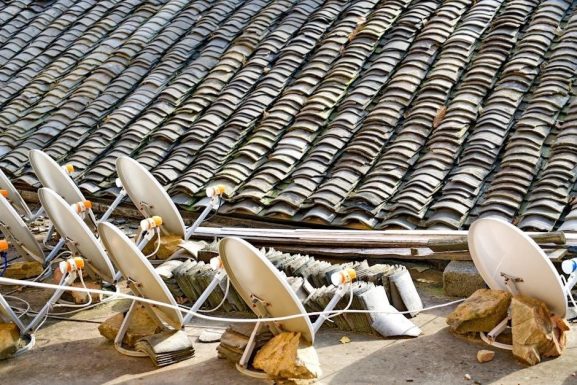Welcome to the Tulsa Antenna TV Channels Guide, your comprehensive resource for accessing free over-the-air television in Tulsa, Oklahoma. Discover local and network channels, HD broadcasts, and cost-effective entertainment without subscriptions. Explore popular stations, troubleshooting tips, and schedules to maximize your free TV experience in Tulsa.
Overview of Antenna TV Benefits
Antenna TV offers a cost-effective way to enjoy free over-the-air broadcasts, providing access to local and network channels without subscription fees. With a one-time investment in an antenna, viewers in Tulsa can watch high-definition TV, including major networks like ABC, CBS, NBC, and FOX, as well as specialty channels for weather, sports, and news. Antenna TV is a reliable alternative to cable or satellite, ensuring uninterrupted access to live events, news, and entertainment. It’s ideal for cord-cutters seeking affordable, high-quality television. Additionally, antenna TV eliminates monthly bills, making it a budget-friendly option for families and individuals. The clarity and reliability of over-the-air signals often surpass traditional paid services, making it a popular choice for viewers in Tulsa.
Importance of Local TV Channels in Tulsa
Local TV channels in Tulsa are essential for staying informed about community news, weather alerts, and regional events. These channels provide unique coverage of Tulsa’s cultural activities, sports, and local government, offering a connection to the city’s vibrant community. They also serve as a vital source of emergency information, ensuring residents are prepared for severe weather and other critical situations. Additionally, local stations often broadcast niche programming, such as high school sports and community events, which are not available on national networks. By tuning into these channels, viewers can engage with their community on a personal level, making local TV a cornerstone of informed and connected living in Tulsa.

Popular Tulsa TV Channels
Tulsa offers a variety of popular TV channels, including major networks like ABC, CBS, NBC, and FOX, as well as specialty channels for weather, sports, and news. Viewers can enjoy high-definition broadcasts and a wide range of programming without subscription fees.
Major Network Channels (ABC, CBS, NBC, FOX)
Tulsa residents can access major network channels like ABC, CBS, NBC, and FOX using an antenna. These channels offer a wide range of programming, including local news, national news, dramas, comedies, sports, and live events. ABC provides popular shows such as Grey’s Anatomy and Modern Family, while CBS features NCIS and 60 Minutes. NBC is known for The Voice and Law & Order, and FOX offers The Simpsons and FOX Sports. These channels are available in high definition, ensuring a crystal-clear viewing experience. With an antenna, viewers in Tulsa can enjoy these networks for free, making them a cornerstone of over-the-air entertainment.
Specialty Channels (Weather, Sports, News)
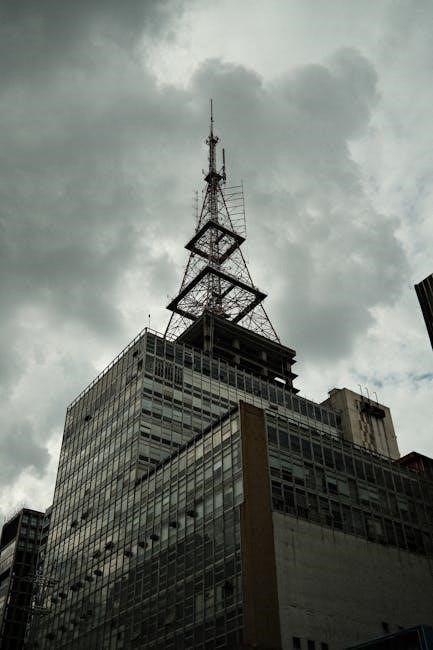
Tulsa’s antenna TV offerings include a variety of specialty channels tailored to specific interests. For weather enthusiasts, channels like Weather Nation provide 24/7 weather updates, while sports fans can enjoy FOX Sports and other local sports broadcasts. News-focused viewers can tune into Court TV for legal coverage or Bounce TV for diverse programming. These channels offer niche content, ensuring there’s something for everyone. With an antenna, viewers in Tulsa can access these specialized networks for free, enhancing their entertainment and information options without subscription costs. Explore these channels to stay informed, entertained, and connected to local and national events.
Local Tulsa Stations and Their Offerings
Tulsa’s local stations provide a diverse range of programming tailored to the community. Stations like KJRH (NBC affiliate) and KTUL (ABC affiliate) offer local news, weather, and community-focused shows. KOKI (FOX affiliate) delivers sports and entertainment, while KOTV (CBS affiliate) covers national news and events. Additionally, niche stations such as Antenna TV and Charge! provide classic shows and action-packed series. These local stations ensure that viewers in Tulsa have access to content that reflects their interests and needs, all available for free with an antenna. This mix of local and network programming makes antenna TV a valuable resource for the Tulsa community.

How to Install an Antenna for TV in Tulsa
Installing a TV antenna in Tulsa involves choosing the right model for your location, mounting it outdoors for optimal signal strength, and using tools like a signal meter and coaxial cable. Rescan channels to ensure proper reception and enjoy free local programming.
Choosing the Right Antenna for Your Location
Selecting the correct antenna for your Tulsa location is crucial for optimal signal reception. Start by determining the distance from your home to the nearest broadcast towers using online tools. Tulsa’s terrain and signal strength vary, so consider an antenna with a range of at least 25 miles for most residents. For rural areas, a 50-mile range antenna is recommended. Ensure the antenna supports both UHF and VHF frequencies, as Tulsa’s channels include both. Directional antennas are ideal if towers are clustered, while omnidirectional antennas work better if signals come from multiple directions. Avoid obstacles like trees or buildings that can block signals. Use a signal meter or app to test and refine your antenna placement for the best results. Always check reviews and recommendations tailored to Tulsa’s specific broadcast conditions.
Best Places to Install an Antenna in Tulsa
The best locations to install an antenna in Tulsa depend on your home’s geography and proximity to broadcast towers. Outdoor antennas typically perform better than indoor ones, as they avoid signal obstruction from walls and windows. Ideal spots include rooftops, attics, or high-mounted poles. Face the antenna toward the direction of the nearest broadcast towers to maximize signal strength. In Tulsa, many towers are clustered in specific areas, so ensure your antenna is positioned to capture these signals. Avoid areas with heavy tree coverage or nearby buildings, as these can block or weaken reception. For multi-story homes, installing the antenna in an upper-level window or attic can improve results. Test different locations and use a signal strength meter to find the optimal spot for clear and consistent reception.
Tools and Materials Needed for Installation
Installing an antenna in Tulsa requires specific tools and materials to ensure proper setup and signal reception. A high-quality TV antenna, suitable for your location, is the primary component. Coaxial cable, with adequate length and minimal signal loss, is essential for connecting the antenna to your TV or tuner. A signal strength meter or app helps optimize antenna placement for the best reception. Mounting hardware, such as brackets and screws, is needed for securing the antenna outdoors or in an attic. Weatherproofing materials, like sealant or tape, protect connections from moisture. A drill, screwdriver, and pliers are handy for installation. Safety gear, such as a ladder or gloves, is crucial for rooftop installations. Optional items include a signal booster for weak areas and a grounding kit for lightning protection. Ensure all materials are durable and designed for outdoor use if needed.
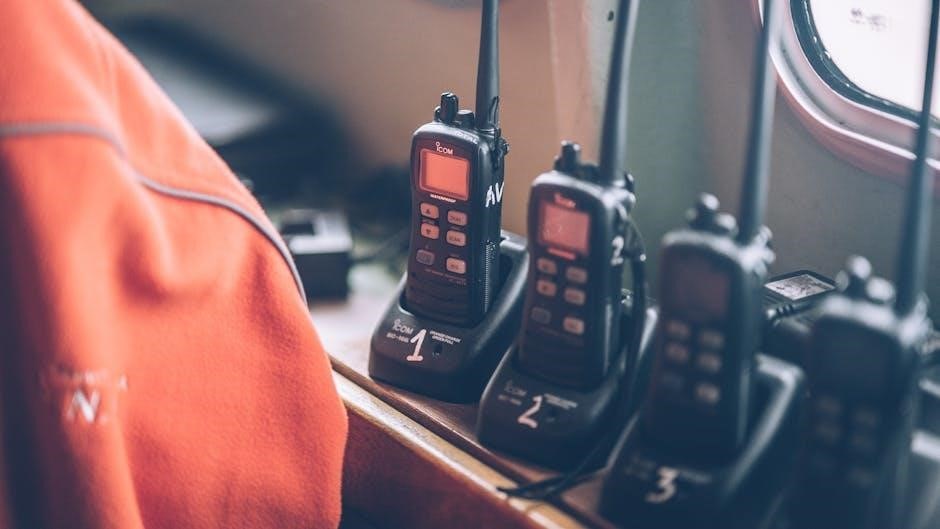
TV Listings and Schedules
Discover Tulsa’s over-the-air TV listings and schedules, featuring live shows, sports, news, and entertainment. Check local guides or apps for channel lineups and broadcast times.
Understanding TV Channel Numbers and Frequencies
TV channel numbers in Tulsa are displayed as virtual channels (e.g., 3.1, 10.1), but broadcasts occur on actual RF channels. RF channels determine the frequency used for transmission, with VHF (Channels 2-13) and UHF (14-36) operating on different bands. Knowing these frequencies helps in selecting the right antenna for optimal reception. Signal power levels, measured in dBm, are crucial for reception quality. Ideal conditions allow reception of signals as low as -70 dBm, but most tuners require at least -65 dBm. Local interference and tuner sensitivity also impact signal quality. Understanding these technical aspects ensures better TV reception in Tulsa.
How to Read and Use TV Listings Guides
TV listings guides provide detailed schedules for Tulsa’s antenna TV channels, helping viewers plan their watching experience. Listings typically include channel numbers, show titles, broadcast times, and brief descriptions. Users can filter by channel type (e.g., major networks, specialty, or local stations) or genre (e.g., news, sports, or entertainment). To use these guides effectively, viewers should note the difference between virtual channel numbers (displayed on TV) and RF channels (actual broadcast frequencies). Many guides also indicate HD availability and live or rerun status. By referencing these listings, viewers can discover new shows, track favorite programs, and stay updated on schedule changes. Regularly checking TV listings ensures you never miss your preferred broadcasts in Tulsa.
Popular TV Shows and Their Broadcast Times
Tulsa antenna TV viewers enjoy a wide range of popular shows broadcast for free. Major network channels like ABC, CBS, NBC, and FOX air hit series such as NCIS, Bull, and The 1 Club, often in prime-time slots. Local stations also feature classic reruns, including Maverick and Court TV, catering to diverse viewer preferences. Sports enthusiasts can catch live games and events on FOX, while news programs like Fox23 News and KJRH News keep residents informed. Broadcast times vary, with many shows airing in the evening between 5:00 PM and 10:00 PM. Specialty channels like Antenna TV offer retro sitcoms, providing entertainment for all audiences. Viewers can easily find their favorite shows by checking Tulsa’s TV listings guide or rescanning channels for updated schedules.
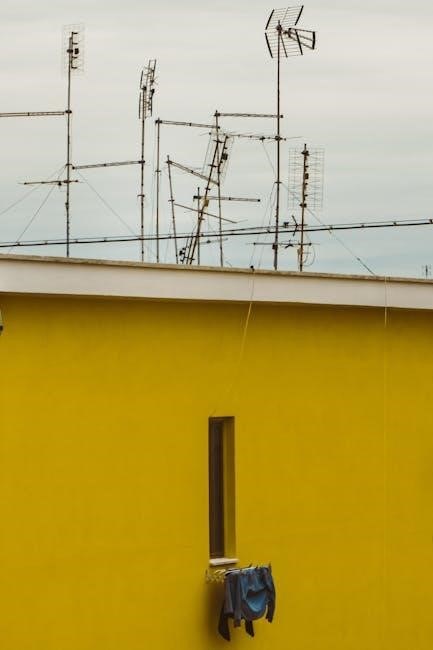
Troubleshooting Antenna Reception
Troubleshooting antenna reception in Tulsa involves addressing common issues like poor signal strength, interference, or incorrect channel scanning. Ensure proper antenna installation, check connections, and rescan channels for optimal performance.
Common Issues with Antenna Signal
Common issues with antenna signals in Tulsa include weak reception, channel dropouts, and pixelation. These problems often arise from physical obstructions like buildings or trees, which block the signal path. Additionally, poor antenna placement, such as positioning indoors or at a low elevation, can significantly reduce signal strength. Interference from other electronic devices or nearby broadcast towers can also disrupt reception. Weather conditions, including heavy rain or snow, may further degrade the signal quality. Understanding these factors is crucial for diagnosing and resolving antenna signal problems effectively in the Tulsa area.
How to Improve Antenna Reception Quality
To enhance antenna reception in Tulsa, ensure your antenna is installed outdoors at a higher elevation, such as the roof, to avoid obstructions like buildings or trees. Use an antenna suitable for Tulsa’s UHF and VHF signals and consider its size based on your distance from broadcast towers. Rescan channels after moving the antenna to optimize signal detection. Check for physical obstructions and ensure proper alignment. An amplifier can boost signal strength, especially for long cable runs or multiple splitters. Regularly inspect connections for damage and update channel listings to maintain optimal reception. These steps will help achieve clearer and more reliable TV viewing in Tulsa.

Rescanning Channels for Better Reception
Rescanning channels is essential for maintaining optimal antenna reception in Tulsa. This process updates your TV’s channel list, ensuring you receive all available stations and improvements in broadcast signals; To rescan, navigate to your TV’s menu, select the “Channel” or “Broadcast” option, and choose “Auto Program” or “Scan for Channels.” This step is crucial after moving the antenna or installing a new one. Regular rescanning helps detect any added channels or signal strength changes, ensuring uninterrupted access to your favorite shows and better overall viewing quality in Tulsa. Perform this simple procedure periodically to stay updated with the latest channel offerings and improvements in broadcast technology.
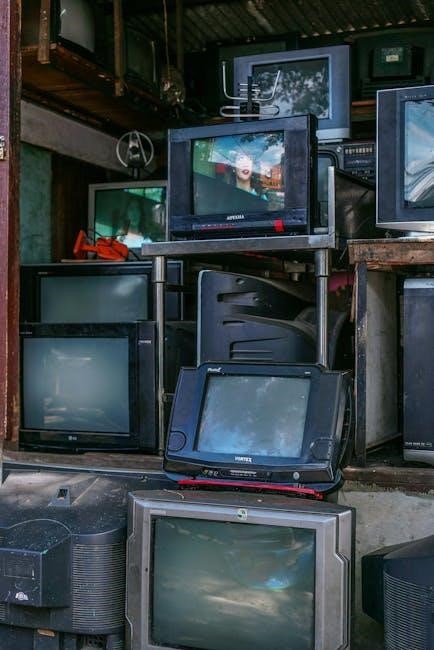
Signal Strength and Technical Information

Signal strength in Tulsa depends on RF channels and local conditions. TVs typically process signals between -5 dBm and -65 dBm, with -65 dBm being the minimum for most tuners. Outdoor antennas at 15 feet or higher improve reception quality. Understanding RF channels helps in selecting the right antenna for UHF or VHF frequencies. Local interference and tuner sensitivity also affect signal quality, making ideal conditions essential for reliable broadcasts.
Understanding RF Channels and Signal Power
RF channels are the actual frequencies TV stations use to broadcast over-the-air signals. In Tulsa, these channels operate on UHF or VHF frequencies, with each station assigned a specific RF channel number. Signal power, measured in dBm, determines how strong the signal is when it reaches your antenna. Most modern TVs can process signals as low as -65 dBm, but ideal conditions (like an outdoor antenna at 15 feet) may allow reception of weaker signals down to -70 dBm. Local interference and tuner sensitivity significantly impact signal quality. Understanding RF channels helps in choosing the right antenna for optimal reception, ensuring you can enjoy clear broadcasts of your favorite Tulsa TV stations.
Minimum Signal Requirements for TV Tuners
TV tuners require a minimum signal power to decode broadcasts effectively, typically ranging from -5 dBm to -65 dBm. Under ideal conditions, such as an antenna installed outdoors at 15 feet with minimal interference, some tuners can process signals as low as -70 dBm. However, most modern TVs operate best with signals around -65 dBm. Local conditions, including RF noise and interference, significantly influence the minimum signal required. A more sensitive tuner can handle weaker signals, while less sensitive ones may struggle. Understanding these requirements helps users optimize their antenna setup and troubleshoot reception issues, ensuring a clearer and more stable viewing experience in Tulsa.
Impact of Local Conditions on Signal Quality
Local conditions in Tulsa significantly influence antenna TV signal quality. Physical obstructions like hills, buildings, and trees can block or weaken signals. Weather conditions, such as heavy rain or storms, may disrupt reception. RF interference from nearby electronic devices or broadcast towers can also degrade signal strength. Additionally, Tulsa’s geography, with its mix of flat and elevated areas, affects signal propagation. Urban areas may experience more interference, while rural areas might have clearer reception. Understanding these factors is crucial for optimizing antenna placement and ensuring reliable access to over-the-air channels. Regularly assessing local conditions helps viewers maintain the best possible signal quality for their free TV experience in Tulsa.

Additional Resources
Explore online tools for checking channel availability, recommended antenna models for Tulsa, and contact information for local TV stations to enhance your antenna TV experience.
Online Tools for Checking TV Channel Availability
Several online tools help you determine which TV channels are available in Tulsa using an antenna. Websites like Channel Master and TV Guide provide detailed maps and listings. These tools allow you to enter your ZIP code and view all accessible channels, including their RF frequencies and signal strength. Some platforms even offer interactive maps showing broadcast tower locations and coverage areas. Additionally, websites like AntennaWeb and TVFool provide advanced signal analysis, helping you choose the best antenna for your location. These resources ensure you can maximize your free TV experience by identifying all available channels in Tulsa and optimizing your antenna setup for reliable reception.
Recommended Antenna Models for Tulsa
For optimal TV reception in Tulsa, several antenna models are highly recommended. The Channel Master CM-4228HD is a popular choice, offering excellent multidirectional reception for both UHF and VHF channels. Another top option is the Winegard Elite 7550, known for its high-gain performance and ability to receive signals from up to 70 miles away. The Mohu ReLeaf is a budget-friendly, eco-friendly option that delivers strong indoor performance. Additionally, the ClearStream MAX-VERSA is praised for its versatility and durability, making it ideal for both indoor and outdoor use. These models are well-suited for Tulsa’s broadcast environment, ensuring reliable access to free over-the-air channels. Always check online tools like Channel Master’s recommendation engine to find the best antenna for your specific location and signal conditions.
Local TV Station Contact Information
For assistance or inquiries about local TV stations in Tulsa, viewers can contact the stations directly. KJRH (NBC) can be reached at (918) 491-0066 or visit their website at kjrh.com. KOTV (CBS) is available at (918) 732-6000 or newson6.com. KTUL (ABC) can be contacted at (918) 445-6441 or ktul.com. KOKI (FOX) is accessible at (918) 495-0500 or fox23.com. Additionally, KWHB (Religious) can be reached at (918) 492-2662 or kwhb.com. These stations provide essential contact information for viewers seeking support, feedback opportunities, or programming details in Tulsa.
Antenna TV in Tulsa offers a cost-effective way to enjoy local and network channels, providing reliable access to major networks and specialty channels for affordable entertainment.
Final Thoughts on Antenna TV in Tulsa
Antenna TV in Tulsa remains a highly recommended option for viewers seeking free, high-quality entertainment and news. With access to major networks like ABC, CBS, NBC, and FOX, as well as specialty channels, residents can enjoy a variety of content without subscription fees. The ability to receive HD broadcasts and avoid cable or satellite costs makes it a cost-effective choice. Additionally, antenna TV is eco-friendly, reducing reliance on cable infrastructure. For those interested in exploring free TV options, Tulsa’s over-the-air channels offer a reliable and diverse viewing experience. Whether for live sports, local news, or favorite shows, antenna TV provides a practical and budget-friendly solution for entertainment in Tulsa.
Encouragement to Explore Free TV Options
Exploring free TV options in Tulsa is a smart choice for budget-conscious viewers seeking quality entertainment and news. With an antenna, you gain access to major networks, specialty channels, and local stations, all in high definition and without subscription fees. This cost-effective solution allows you to enjoy live sports, favorite shows, and stay informed with local news. It’s an eco-friendly alternative to cable or satellite, reducing reliance on paid services. For those looking to cut the cord or supplement their viewing options, antenna TV offers a reliable and diverse experience. Take the opportunity to discover the benefits of free over-the-air television and enhance your home entertainment setup in Tulsa today!
